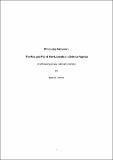Producing airpower : the rise and fall of neo-liberalism’s defence agenda
Abstract
Neo-liberalism stands out as one of the most potent contemporary political philosophies. Neo-liberal governments re-fashioned states’ economies and neo-liberal ideas came to dominate international financial organizations. Perhaps nowhere are the challenges of translating neo-liberal theories into policy more apparent than in defence. The existing institutions and practices whereby states produce military power are often anathema to neo-liberal concepts of efficiency. Bureaucratic armed forces and national champion defence firms, within this context, clash with neo-liberalism’s ideological hostility to hierarchical-bureaucratic systems and belief that market mechanisms generate efficiency. Neo-liberal governments therefore developed policies for applying the philosophy’s economic formulae to defence. Two broad categories of reforms—enhancing inter-firm competition for contracts and outsourcing activities to the private sector—emerged as central to the neo-liberal defence agenda. Surprisingly, in light of neo-liberal policies’ adoption by militarily active states, no study has systematically examined these reforms’ content and impact. My article fills this lacuna by examining the state—the United Kingdom—that most consistently enacted neo-liberal defence reforms. To preview the conclusion, neo-liberalism did not prove the panacea that proponents espoused. This agenda’s internal logic nevertheless drove policymakers, from Prime Minister Margaret Thatcher’s regime (1979-90) onwards, to compensate for the negative externalities generated by one set of neo-liberal reforms by introducing further market mechanisms. Neo-liberal policies’ initially disappointing outcomes thus resulted in further neo-liberal reforms rather than a reassessment of the philosophy’s suitability to this domain. Nevertheless, each of the neo-liberal defence agenda’s two pillars suffered from internal contradictions that ultimately stymied their application.
Citation
DeVore , M R 2019 , ' Producing airpower : the rise and fall of neo-liberalism’s defence agenda ' , New Political Economy , vol. 24 , no. 6 , pp. 873-891 . https://doi.org/10.1080/13563467.2018.1562431
Publication
New Political Economy
Status
Peer reviewed
ISSN
1356-3467Type
Journal article
Collections
Items in the St Andrews Research Repository are protected by copyright, with all rights reserved, unless otherwise indicated.

